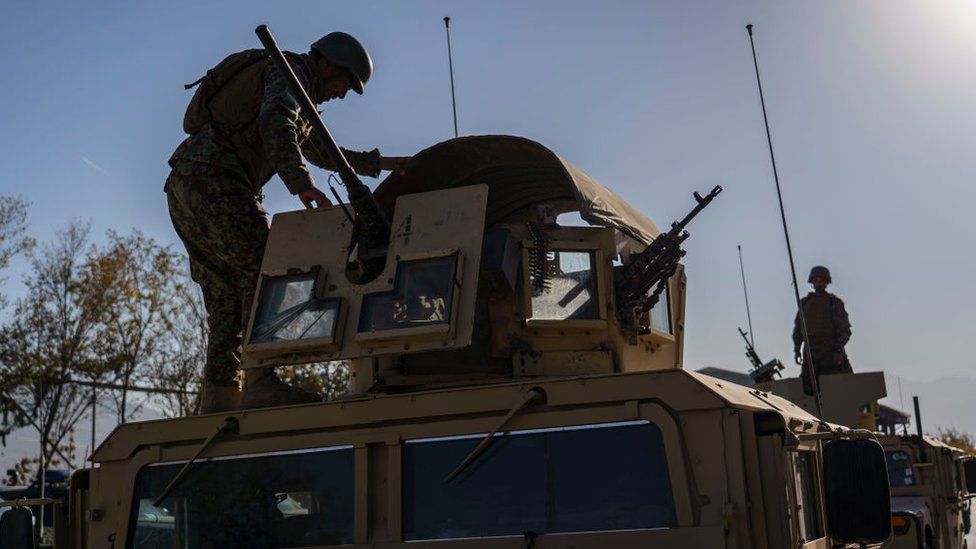President Biden stood in the Roosevelt Room at the White House and declared the end of U.S. involvement in the war in Afghanistan. He spoke from the same spot where former President George W. Bush announced the beginning of the war 20 years ago with a bombing campaign.
“It’s time to end America’s longest war,” Biden said. “It’s time for American troops to come home.”
The president said the U.S. will “keep providing assistance” to the Afghan security forces, and reposition counterterrorism forces “over the horizon,” to make sure Afghanistan does not once again become a haven for terrorists planning to attack the U.S.
That was the reason for invading Afghanistan in the first place after the 9/11 attacks, when the Taliban government refused to turn over the mastermind of those attacks, al-Qaida leader Osama Bin Laden.
Defense Secretary Lloyd Austin, speaking this week from NATO headquarters in Brussels, pledged continued U.S. training and support for the Afghan security forces.
“Thanks to the efforts of coalition and ally training,” Austin said, “the Afghan security forces are better and more capable of securing their borders and protecting their fellow citizens. We will continue to support them in those efforts. We will look to continue funding key capabilities, such as the Afghan Air Force.”
Contractors needed
Still, both those goals — continued support for the Afghan military and a regional counterterrorism effort — raise more questions.
Right now, the U.S. military and its NATO allies train the Afghan army and police, pay them and repair the American-supplied equipment. Who will do this once the allied forces leave? The only realistic answer is civilian contractors.
“Now, it is well known that the Afghan security forces need these contractors to maintain their equipment, manage supply chains, and train their military and police to operate the advanced equipment that we have purchased for them,” said John Sopko, the special inspector general for Afghan reconstruction, during a presentation last month at the Center for Strategic and International Studies.
And with roughly 3,500 U.S. troops and some 7,000 NATO forces leaving, will the Taliban accept the current 16,000 contractors, including 6,000 Americans, that are currently in the country?
“What I see is everyone focusing on the troops withdrawal and not the loss of the contractors,” said one U.S. official who’s involved in the financial efforts, but was not authorized to speak publicly. “Also, no one’s focusing on the financial assistance.”
Fred Kagan, a defense analyst who advised the U.S. military in Afghanistan, said the American-led training effort will likely come to an end.
“I do not see how the U.S. can continue to support the Afghan military in any meaningful way, other than financial, once our forces departed the country,” he said.
Ongoing expenses
So how much money will the US continue to spend on Afghanistan?
As of last December, the U.S. had spent $88.3 billion to help the Afghan government provide security in Afghanistan. That’s more than 60 percent of all U.S. reconstruction funding since 2002. Another $3 billion will be spent this year.
Even with all that money spent and with ongoing training efforts, the Afghan forces are plagued by poor leadership, desertions and incompetence.
One U.S. general who spent years in Afghanistan said this about U.S. training of the Afghan forces:
“Sadly, that cake was not fully baked. We were impatient, we set arbitrary exit criteria, and our withdrawal from many areas created vacuums for the Taliban return with an Afghan Army that was not ready, not getting paid regularly, poorly led, and suffering massive casualties, creating a demoralizing and unstainable reality for the security forces.”
Rep. Elissa Slotkin, a Michigan Democrat, and former Pentagon official, has questions of her own.
“The two critical things I’ll be looking to hear come directly from the original goals of this war,” Slotkin said. “First, what will the security architecture look like to ensure that terrorists don’t reconstitute and prepare attacks against us or our allies?”
“Secondly, what is the diplomatic plan for maintaining some insight and leverage in Kabul?” she added. “If preventing international terrorist attacks is connected to the county living up to basic international norms and standards, we’ll need a significant diplomatic plan to ensure Kabul isn’t descending into chaos.”
‘Over the horizon’
The counterterrorism mission, according to Biden, will take place outside Afghanistan. “Over the horizon” means either other countries — perhaps Pakistan or Tajikistan — or on ships in the Persian Gulf. Will the U.S. Embassy in Kabul have any counter-terror officials to gather intelligence or work with Afghans?
The Taliban have yet to break with al-Qaida, a condition of the U.S.-Taliban agreement in February 2020. U.S. officials in the Afghan city of Jalalabad told NPR two years ago that the Taliban continue to work with al-Qaida in eastern Afghanistan, while both U.S. and Afghan airstrikes have targeted al-Qaida militants in southeastern Helmand Province.
An expansion of such terrorist activity worries retired Gen. David Petraeus, who commanded U.S. forces in Afghanistan and later ran the CIA.
Petraeus said he worries the Taliban will continue to gain ground militarily and allow terrorist groups to operate.
“Frankly, we’re also going to lose that platform that Afghanistan provides for the kind of regional counterterrorism campaign,” he said. “I’m really afraid that we’re going to look back two years from now and regret the decision and just wonder if whether we might not have sought to manage it with a modest, sustainable, sustained commitment that could have ensured that al-Qaida and the Islamic State would not re-establish sanctuaries.”
Fred Kagan, the defense analyst, said it’s not sufficient for U.S. personnel to be based outside Afghanistan and looking for threats inside the country.
“We will not have the intelligence we need or the ability to act in a timely fashion on intelligence we do get to conduct periodic and very limited strikes on individual targets,” Kagan said.
“Few theories of war or counterterrorism have been more thoroughly discredited over the past three decades than the idea that such strikes can disrupt, let alone defeat, a major terrorist organization,” he added. “Our withdrawal of forces therefore means the de facto end of serious counter-terror operations.”
Carter Malkasian, who spent years in Afghanistan working with Marines as a civilian adviser, said there should be more emphasis on working with neighboring countries — Pakistan, Iran, Russia and China — to prevent a rise in terrorist activity in Afghanistan.
“It would be useful,” Malkasian said, “if the United States can get a diplomatic agreement for continued statements by the region, to the Taliban, that terrorist activity is unacceptable, and that they commonly endorse military action and other sanctions if it occurs. The region has interests in Afghanistan that are much deeper than U.S. interests.”
In an interview with NPR, Roya Rahmani, the Afghan ambassador to the U.S., said of the White House decision, “So as they have decided to withdraw the troops, regardless of the conditions on the ground, we respect their decision. But then we are hoping that with their support, we would be able to continue to protect and defend ourselves.”















